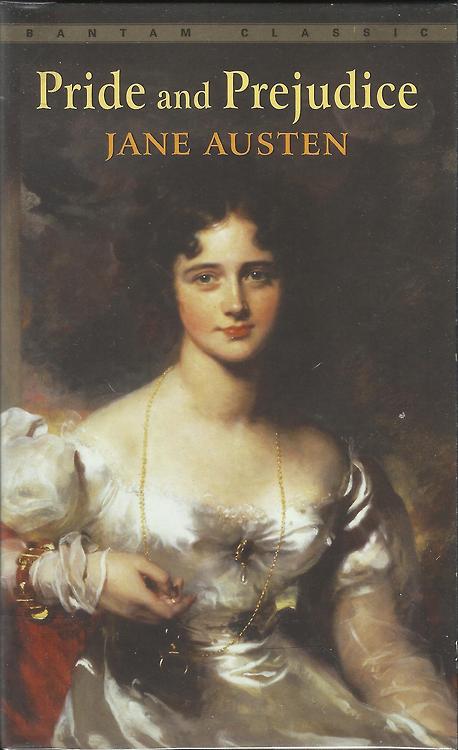Book Review: Pride and Prejudice by Jane Austen
The Bennet family is somewhat well off at their small estate of Longbourn–for now. But since the estate can only be inherited in the male line, and the family has five daughters with no sons, if Mr. Bennet kicks the bucket, the rest of the family will fall into poverty. Mrs. Bennet’s best hope is to get as many daughters as possible married, and married “well.” Hope appears with the sojourn in the local area of wealthy bachelor Mr. Bingley.

Things seem to be going well at first. Mr. Bingley is a very pleasant fellow, and quite enjoys chatting with eldest Bennet daughter Jane, who is both attractive and sweet natured. Second daughter Elizabeth sees this as a good match. It’s too bad that Mr. Bingley’s best friend, Mr. Darcy, who’s even wealthier, is such a jerk.
Also in town are a regiment of dashing soldiers (it being the Napoleonic era), much to the delight of frivolous younger sisters Kitty and Lydia (who is the youngest but also the tallest, and well-endowed for her age.) Middle sister Mary, the plainest of the girls, claims to prefer her books. Among the soldiers is a new lieutenant, Mr. Wickham, who is penniless but has the best manners and considerable charm. He and Elizabeth get on swimmingly, at least partially based on their mutual dislike of Mr. Darcy.
To complicate matters, the designated heir to Longbourn, Mr. Collins, shows up. He makes an okay living as a kept minister for Lady Catherine de Bourgh, and thinks that marrying one of his distant cousins will help both him and them. Jane’s theoretically unavailable, so he turns his sights on Elizabeth.
Mr. Collins is a self-righteous bore, and a suck-up, and Elizabeth is well aware that she’s a target of convenience, so she turns him down hard. Several times, as he’s convinced he’s a great catch and she’s only playing hard to get. Once Mr. Collins finally gets the message, Elizabeth’s “old maid” best friend Charlotte Lucas swoops in and grabs the brass ring. Charlotte’s a very practical woman.
Somewhat later, Elizabeth learns that Mr. Darcy has fallen in love with her, but his proposal makes it clear that he’s in love with Elizabeth despite her embarrassing relatives and lower social status. She gives him a good tongue-lashing about his haughtiness, and also brings up what she’s heard from Mr. Wickham. Mr. Darcy is taken aback, but despite his obvious hard feelings is far more gracious about being refused than Mr. Collins.
Only after this does Elizabeth learn the truth about the dealings between Mr. Wickham and Mr. Darcy, and something of Mr. Darcy’s true and better nature. Her heart warms towards Mr. Darcy, but surely it is too late. Oh, and now Lydia’s gone and eloped!
This is one of the classic romantic novels, and there is much of the romantic comedy in it. About time I finally got around to it! Although the society the characters live in becomes more foreign every decade (my copy has copious endnotes explaining various terms and allusions), the characters themselves are familiar. I certainly have met a Mary Bennet or two, and definitely a Mr. Collins!
The foreignness really comes across in the daughters’ situation. While at the very low end of the landed gentry class, they are gentry, so have not been taught the practical skills like cooking a lower-class woman would use to get along, but also not the sort of skills that would allow them to make a living at a profession or business, because at the time, women weren’t supposed to do that. Their “accomplishments” are largely decorative. Marriage to someone who can afford a servant or two is a must!
Likewise, social conventions cause difficulties with clear communication. If Jane could simply write Mr. Bingley directly, it would save some heartache, but instead she must send letters to his sister Miss Bingley, who is not in favor of the match and thus has reason to conceal Jane’s affection from her brother.
But this is, in the end, romantic comedy, so the ending is mostly happy (the Lydia situation is not happy, but there you are.)
Romantic comedy just isn’t my genre, so I can admire the sharply drawn characters and superior writing, but this is not a book I will be putting on my favorites list. Many, many people adore this book, so if you haven’t tried it, by all means do–it’s in the public domain and affordable copies abound, or you can get it at the library.
Or, well, there are the movie versions:

